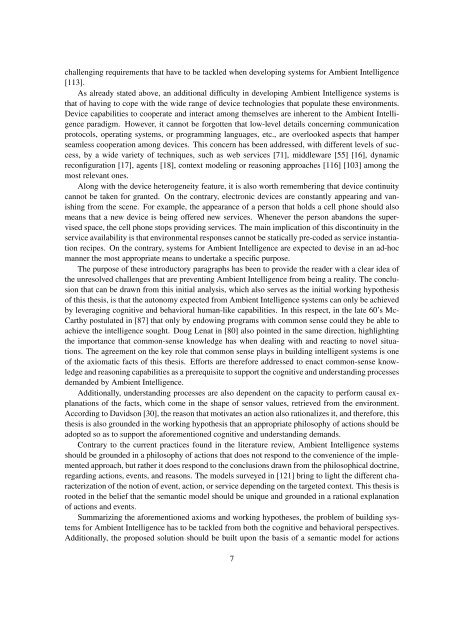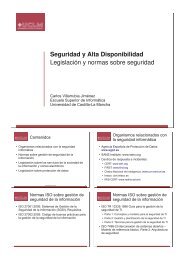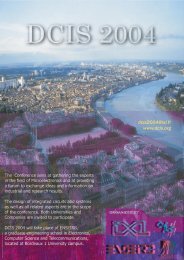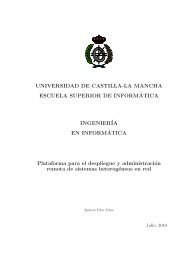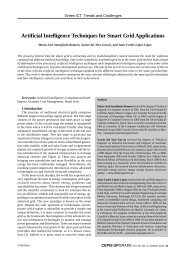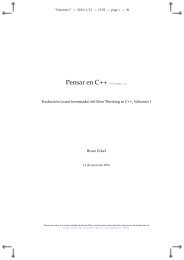MarÃa José Santofimia Romero - Grupo ARCO - Universidad de ...
MarÃa José Santofimia Romero - Grupo ARCO - Universidad de ...
MarÃa José Santofimia Romero - Grupo ARCO - Universidad de ...
You also want an ePaper? Increase the reach of your titles
YUMPU automatically turns print PDFs into web optimized ePapers that Google loves.
challenging requirements that have to be tackled when <strong>de</strong>veloping systems for Ambient Intelligence[113].As already stated above, an additional difficulty in <strong>de</strong>veloping Ambient Intelligence systems isthat of having to cope with the wi<strong>de</strong> range of <strong>de</strong>vice technologies that populate these environments.Device capabilities to cooperate and interact among themselves are inherent to the Ambient Intelligenceparadigm. However, it cannot be forgotten that low-level <strong>de</strong>tails concerning communicationprotocols, operating systems, or programming languages, etc., are overlooked aspects that hamperseamless cooperation among <strong>de</strong>vices. This concern has been addressed, with different levels of success,by a wi<strong>de</strong> variety of techniques, such as web services [71], middleware [55] [16], dynamicreconfiguration [17], agents [18], context mo<strong>de</strong>ling or reasoning approaches [116] [103] among themost relevant ones.Along with the <strong>de</strong>vice heterogeneity feature, it is also worth remembering that <strong>de</strong>vice continuitycannot be taken for granted. On the contrary, electronic <strong>de</strong>vices are constantly appearing and vanishingfrom the scene. For example, the appearance of a person that holds a cell phone should alsomeans that a new <strong>de</strong>vice is being offered new services. Whenever the person abandons the supervisedspace, the cell phone stops providing services. The main implication of this discontinuity in theservice availability is that environmental responses cannot be statically pre-co<strong>de</strong>d as service instantiationrecipes. On the contrary, systems for Ambient Intelligence are expected to <strong>de</strong>vise in an ad-hocmanner the most appropriate means to un<strong>de</strong>rtake a specific purpose.The purpose of these introductory paragraphs has been to provi<strong>de</strong> the rea<strong>de</strong>r with a clear i<strong>de</strong>a ofthe unresolved challenges that are preventing Ambient Intelligence from being a reality. The conclusionthat can be drawn from this initial analysis, which also serves as the initial working hypothesisof this thesis, is that the autonomy expected from Ambient Intelligence systems can only be achievedby leveraging cognitive and behavioral human-like capabilities. In this respect, in the late 60’s Mc-Carthy postulated in [87] that only by endowing programs with common sense could they be able toachieve the intelligence sought. Doug Lenat in [80] also pointed in the same direction, highlightingthe importance that common-sense knowledge has when <strong>de</strong>aling with and reacting to novel situations.The agreement on the key role that common sense plays in building intelligent systems is oneof the axiomatic facts of this thesis. Efforts are therefore addressed to enact common-sense knowledgeand reasoning capabilities as a prerequisite to support the cognitive and un<strong>de</strong>rstanding processes<strong>de</strong>man<strong>de</strong>d by Ambient Intelligence.Additionally, un<strong>de</strong>rstanding processes are also <strong>de</strong>pen<strong>de</strong>nt on the capacity to perform causal explanationsof the facts, which come in the shape of sensor values, retrieved from the environment.According to Davidson [30], the reason that motivates an action also rationalizes it, and therefore, thisthesis is also groun<strong>de</strong>d in the working hypothesis that an appropriate philosophy of actions should beadopted so as to support the aforementioned cognitive and un<strong>de</strong>rstanding <strong>de</strong>mands.Contrary to the current practices found in the literature review, Ambient Intelligence systemsshould be groun<strong>de</strong>d in a philosophy of actions that does not respond to the convenience of the implementedapproach, but rather it does respond to the conclusions drawn from the philosophical doctrine,regarding actions, events, and reasons. The mo<strong>de</strong>ls surveyed in [121] bring to light the different characterizationof the notion of event, action, or service <strong>de</strong>pending on the targeted context. This thesis isrooted in the belief that the semantic mo<strong>de</strong>l should be unique and groun<strong>de</strong>d in a rational explanationof actions and events.Summarizing the aforementioned axioms and working hypotheses, the problem of building systemsfor Ambient Intelligence has to be tackled from both the cognitive and behavioral perspectives.Additionally, the proposed solution should be built upon the basis of a semantic mo<strong>de</strong>l for actions7


